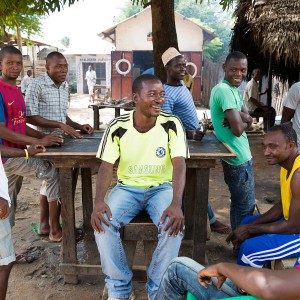Last month, Brian Paul Mnyampi and Sanne van den Berg went to meet community radio station Radio Kwizera in Ngara, in the far North West of Tanzania.
The small town boasts a population of only 10,000 people – but its radio station, Radio Kwizera, is the 9th most popular station in the country and has a huge presence in the lives of the Ngara community.
Speaking with journalists from the radio station and with people in Ngara, Brian reports on how ‘old school’ community radio embraces key lessons that need to be heard across all ICT4D projects: go where your audience is, make sure that media for good is GOOD MEDIA, and keep innovating - no matter what platform you are using.

Photo credit: Sala Lewis
The starting point: the techie/non-techie divide
I am a techie, through and through.
I work at Buni Hub, a Making All Voices Count partner in Dar es Salaam, where we work with tech-focused individuals and organisations in Tanzania. We have technology in our DNA but, as we engage more and more in tech4dev, I am aware that we are working in a techie space, talking to other techies - and I feel that we miss the interactions with the day to day problems of the communities tech4dev projects are often aimed at helping.
The chance to visit Ngara and Radio Kwizera, was too good to pass up – I wanted to see how they were engaging their community, and maybe get rid of a few of my own misconceptions about community radio.
Radio Kwizera - new attitudes to an old platform
First off, I have to say yes, visiting the station and talking with journalists and producers was a huge eye-opener. I’m not sure exactly what I expected, but community radio stations in Tanzania (especially ones supported by NGOs) are generally seen as old-school. From a techie perspective, radio also feels like the most conservative platform out there, the elderly uncle of the tech field, so I was going in with an idea of a stuffy, static organization.
It couldn’t have been more different. There is huge energy at Kwizera, the majority of the staff producing content are young, they’re using Skype for call-ins to the station (because internet connection is pretty good and the cost of calling in could put people off) and using an SMS aggregator to log comments, which can be up to 100 per show.
Talking to community representatives - from the local government to the head of the Boda Boda Association - it’s clear that Kwizera has a great standing in the community too. When it speaks, is a force to be reckoned with. Its programmes reach an incredibly diverse audience, but the station is about entertainment, building a community and sharing information, not about the all-too-familiar ‘NGO-issue’ programming or a government official talking at the microphone for 30 minutes.
So what were my take-aways?
- Go where your audience are: I left the conversations with the Ngara community and with Radio Kwizera feeling, more and more, that we need to be careful to make sure projects (especially short term projects) go where the audience are, rather than building new platforms they don’t use – and that’s why Kwizera is successful. They rely on the most accessible medium in the area, radio, and supplement with facebook, skype and SMS. It’s a good lesson for everyone about the balance of ‘new’ tech they can expect people to adopt, vs ‘old tech’, that might get better engagement.
- Media for good also needs to be good media. Yes, we all want to learn new things, and there are some essential messages out there that can change and even save lives, but it needs to be balanced (if not far outweighed) by entertaining and engaging programmes. The young team at Kwizera have built a loyal base of listeners, and are constantly balancing ‘issue-based’ programmes with entertainment. That's how they have the leverage to support social change.
- Innovation should be a constant activity: Just because the platform is 'old school', doesn’t meant the attitude to running it has to be. Radio, like any other platform requires people who are constantly asking what’s working? How can we do things better? Where can we take risks and lead change?
What’s next?
There’s still lots more that Kwizera can do: looking at the huge reams of data coming in through SMS and Facebook, I’m already thinking of how this can better aggregated, analysed and used; there is space for building bridges across community divides - when we met together with community leaders from across Ngara, its clear that while the range of programs has been tailored to specific audiences, there is a clear call for programmes that bridge the divide.
But, on the long drive back to Dar, I challenged myself to remember that innovation does not always mean inventing something new, but often means taking something and re-shaping it. While we absolutely have to dream to innovate, we’ve also got to make the most of what’s already there.